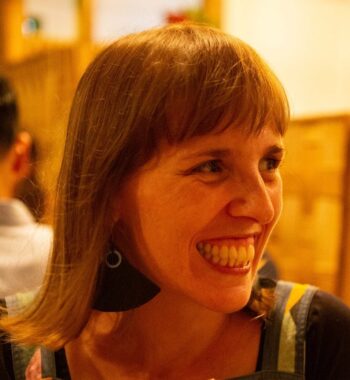29 May, 2024 | Filed under: Brokering, Learning, Uncategorized |
In June 2023, partners of the Sustainable Development Goals Partnership (SDGP) facility of RVO gathered to share their experiences and write their stories about engaging in Public Private Partnerships (PPPs). The writing workshop (‘writeshop’) was part of a four year PBA accompaniment trajectory to RVOs SDG Partnerships. A number of PBA Associates worked on this accompaniment trajectory. The writeshop is a method of the Barefoot Guide to help practitioners reflect on their practice, and was facilitated by the Barefoot Guide Connection together with PBA.
Stories from the frontline of Public Private Partnerships is an anthology of eleven compelling stories, each of them a testament to the trials, triumphs, and untapped potential inherent in PPPs. Accompanying the stories are an analysis and insights, all of which capture the essence of our collective pursuit: to find ways to work together that make a difference.
4 Apr, 2024 | Filed under: Brokering, General News, Learning, Uncategorized |
This year’s edition of the CSSI Symposium is hosted by the University of Cape Town.
PBA Associates will host an online panel discussion on 5th April on Working with communities: Can partnership brokering help to navigate power imbalances (and promote inclusion)?
The panel will be convened by Leda Stott and Bulbul Baksi, and the speakers will be Kwasi Amponsah Boateng, Anindita Majumdar, Olukayode (Sbaba) Soremekun and Peni Tawake. Drawing upon experiences from different country and cultural contexts the panel will discuss whether partnership brokering and the promotion of principle-based collaboration can make a difference in the navigation of power with and among marginalised communities, and how it might assist communities to express and make use of their own power.
6 Oct, 2023 | Filed under: Brokering, Research, Transforming, Uncategorized |
PBA contributed to an advocacy campaign involving UN Department of Economic and Social Affairs, The Partnering Initiative and others, focused on creating a more enabling environment for partnerships. PBA Associates prepared a paper for the final report on the contribution and value that partnership brokers bring to partnerships.
The report was launched at the UN General Assembly in September. One of the key findings of the study was that a very significant determinant of a partnership’s success was related to having an independent third-party specialist providing facilitation and support. The report pointed out that partnerships need to invest in the process of partnering, where possible with the support of such a specialist (broker), to ensure inclusion, unlock innovation and set the partnership up for success. They should also build in stronger monitoring to demonstrate value creation, measure progress to allow adaptation, and keep the partnership healthy and effective.
10 Mar, 2023 | Filed under: Brokering, Transforming |
 If you’ve ever worked in the development industry, you may have felt a sense of unease about the power dynamics at play. This month, in our Stories from Practice, we meet Soli Middleby, who delves into this discomfort and offers insights on how to navigate it, through her paper, “Mediating the power imbalances of development: A paradox for partnership brokers,”
If you’ve ever worked in the development industry, you may have felt a sense of unease about the power dynamics at play. This month, in our Stories from Practice, we meet Soli Middleby, who delves into this discomfort and offers insights on how to navigate it, through her paper, “Mediating the power imbalances of development: A paradox for partnership brokers,”
Middleby argues that the western development industry is built upon complex and historic power imbalances that tend to center the interests and perspectives of donors. This can undermine effective partnerships and ultimately perpetuate the very inequalities that we aim to address.
Using the practice of partnership brokering as a lens, Middleby explores how these power imbalances operate in practice, how they can be disrupted, and how they are ultimately reproduced by brokers and other development professionals. She concludes that we face an uncomfortable paradox in which our work to transform power imbalances also maintains the identities, institutions and interests that reproduce them and that how we choose to hold this paradox is critical if we are to ever ‘rethink development’
This paper is a thought-provoking read for anyone in the development field who is grappling with these issues. It challenges us to consider how we can hold this paradox and still work towards rethinking development. You can read Soli Middleby’s paper here, for more practical insights.
5 Dec, 2022 | Filed under: Accreditation Scheme, Brokering, Learning, Reflective Practice, Transforming |

Annie Sloman
This month, in our Stories from Practice, we meet Annie Sloman, as she explores and reflects on how partnership brokering should, and can, support decolonization of aid.
Based on her experience as a partnership broker in Timor-Leste, Annie Sloman discusses possible contributions of partnership brokering to decolonization and combatting racism in international development and humanitarian action.
She unravels the hidden assumptions about power and privilege that we often take for granted in our practice, and how such assumptions can, in fact, be counter-productive in reducing systemic inequalities that we are working so hard to overcome.
She gives insightful ideas on how issues of power and privilege can be addressed immediately and continuously in ongoing partnership activities.
Read Annie’s paper for six practical guidelines as to what you can and should do differently in your practice, as a partnership broker – especially if you wonder whether your practice re-enforces colonial inequalities or transforms societies for a better world.
5 Sep, 2022 | Filed under: General News |
What can each of us do, within our own working context, to respond to this impassioned plea from Ukrainian NGOs?
Is principled partnering an act of solidarity?
8 Jun, 2022 | Filed under: Brokering, General News, Uncategorized |
Join PBA Associates Bulbul Baksi, Leda Stott & Ros Tennyson during a panel discussion at the upcoming CSSI 2022: Cross Sector Social Interactions Conference. This will be a facilitated dialogue drawing on both academic and practitioner insights of participants on how partnership brokering can assist transformation in different contexts.
Click here to learn more.
PANEL: Partnership Brokering: Changing the Rules of the Game. From challenges to breakthrough.
DATE: 22nd June 2022 | Time: 15:00 – 16:40 CET
REGISTER: https://event.wur.nl/cssi-2022/subscribe
Please share this invitation with your networks.
25 May, 2021 | Filed under: General News, Research, Uncategorized |
The Partnership Brokers Association was commissioned by Charter for Change, through the Dutch Relief Alliance, to examine the interface between humanitarian and partnering principles, and contribute to the debate on principled humanitarian aid and localisation. The full report ‘Towards Principled Humanitarian Action in Conflict Contexts – Understanding the Role of Partnerships’ captures the voices of over 120 local/national humanitarian practitioners in Nigeria and South Sudan, and provides some fresh insights into understanding how partnering might support/enable principled humanitarian action.
The report will be launched and discussed on Wednesday 2nd June at 2-3.30pm CET, at an online event moderated by PHAP. We invite you to register and join what will undoubtedly be an important and engaging conversation.
21 May, 2021 | Filed under: Brokering, Supporting, Training, Uncategorized |
PBA’ s new service, 1-2-1 Professional Support for Partnership Brokers has been designed to support partnership brokers on-the-job, wherever they are in their practice. Whether you are taking on a new partnership brokering role, working through a challenge, aspiring to deepen your practice and grow your skills – you can benefit from 1-2-1 support. The service is provided by a Practice Partner – an experienced, PBA accredited partnership brokers – will work with you 1-2-1. You can choose the Practice Partner you would like to work with under one of the three support packages:
- Sounding Board: up to three focused sessions to navigate a specific partnership brokering challenge
- Deepen Your Practice: longer term professional development support, for example, one session per month over 10 months, plus sharing resources and tools
- On Demand: a set number of sessions to be used as and when needed, within a defined time, as agreed between you and your Practice Partner, a retainer-type agreement
More information on 1-2-1 Professional Support.
Download: 1-2-1 Professional Support brochure (pdf)
22 Mar, 2021 | Filed under: General News, Online courses, Remote partnering, Training, Transforming, Uncategorized |
The Certificate in Brokering Partnerships Remotely is a five week course delivered online. The next training will be running from 8 September – 6 October 2021. Weekly webinars will be hosted on Wednesdays at 3:00PM UTC (8:00 Seattle & Vancouver / 10:00 Bogota, Lima & Mexico City / 11:00 Ottawa & Washington DC / 12:00 Brasilia / 15:00 Dakar / 16:00 Abuja & London / 17:00 Johannesburg & Madrid / 18:00 Nairobi).
The course is delivered in English but some of the materials (Course Manual) can be available in Spanish and Portuguese. Participants can also choose to submit their journals in Spanish or Portuguese instead of English.
To get more information and register for the course please visit the Remote Partnering website.
28 Jan, 2021 | Filed under: General News, Online courses, Remote partnering, Training, Transforming, Uncategorized |
Over the last year, being able to collaborate effectively on partnerships, networks and alliances that are operating remotely has become a ‘must-have’ skill. Our online Brokering Partnerships Remotely course helps to grow your skills, confidence and competencies in brokering partnerships at a distance. This training is an opportunity to experiment and test out novel methods and solutions for the ‘new normal’ of operating remotely. Learnings from the course can be put to immediate use in your day to day partnering work.
Three regional cohorts have been planned for 2021 (more information and to register):
- Europe, Africa, Asia: 3 – 31 March 2021 with Bulbul Baksi, Ros Tennyson and Lola Gostelow
- Americas cohort: 5 May – 2 June 2021 with Catherine Russ, Helga van Kampen and Jocelyne Daw
- Oceania and South-East Asia: 18 August – 15 September 2021 with Julie Mundy and Kate Hayes
This course is also offered on commissioned basis. If your organisation might be interested, please contact info@partnershipbrokers.org.
23 Jun, 2020 | Filed under: General News, Learning, Transforming, Uncategorized |
Partnerships for the Goals: Is it time to reframe SDG 17 so it’s fit for transformation?

You can now watch the recording of the first in our series of Global Dialogues on Partnership.
SDG 17 – does it reflect an old paradigm of international cooperation? Of donor-recipient relations? Of developed-developing countries? Does it give primacy to economic growth? Why does it represent a narrow conceptualisation of partnerships, and use language that is contradictory to the language of transformation throughout Agenda 2030?
To watch please click here.
31 May, 2020 | Filed under: Reflective Practice |
In this edition of our Stories from Practice we are bringing a thought-provoking piece on courage.
PBA Accreditation alumni Kym Burke takes us on a highly insightful journey of developing a personal perspective and meaning around what it takes to practice courageously and encourage others to do the same. Taking the partnership broker’s role and the concept of partnering into new territory, Kym explores the concept of courage in relation to fear, vulnerability and risks
Courage as a response to uncertainty is part of the partnering practice. Exposing one’s vulnerability in the face of the uncertainty of a particular partnering situation and how it might unfold irrespective of ‘best laid plans’ takes courage. The author expands on the idea of courage as a core value for partnering by exploring what it takes to practically embed it into one’s practice and how to build a capacity for courage in others. The paper explores the costs and risks of going beyond business-as-usual in search for better solutions and a better understanding of the challenges.
Read Kym’s paper here and tell us about your moments of courage and the break-throughs that followed on Twitter using #partnershipbrokers.
29 Jan, 2020 | Filed under: Reflective Practice, Uncategorized |
In this edition of Stories from Practice, we share a paper produced by PBA Accreditation Alumni Donna Leigh Holden.
Australia-based Donna works in International Development and decided to focus her mentored reflective practice on her engagement with civil society partnerships in Asia and the Pacific.
She explores how aid effectiveness frameworks are applied in civil society partnerships and how such frameworks impact structural challenges around equity, transparency and mutual benefit.
Drawing on her experience and observations in this field, she brings examples of how partnership brokers can help partners navigate complexity and address potential structural challenges.
‘Development partnerships are not only an end, but an important means for working with this complexity. There are however perverse incentives and structural inequities in play within the development industry that makes this challenging. This paper explores a few of these inequities and proposes that good partnerships for development require moving beyond shared objectives and necessitate a wide-ranging set of reforms which shift the way that different development actors do business.’
Download Donna’s paper here and tell us about your experiences when working wihthin effectiveness frameworks in the International Development sector via Twitter #partnershipbrokers.
24 Jan, 2020 | Filed under: General News, Online courses, Remote partnering, Training, Transforming, Uncategorized |
The Certificate in Brokering Partnerships Remotely is a five week course delivered online. If you are a partnership practitioner operating remotely and you would like to: explore the issue; build insights and confidence; develop practical approaches suitable for your context and earn a CERTIFICATE in Brokering Partnerships Remotely, you are welcome to join one of the upcoming cohorts:
- Americas cohort: 14 October – 12 November
- Europe, Africa, Middle East & South Asia cohort: 21 October – 18 November
- Oceania & South Asia cohort – week of 19 October – 16 November 2020
To get more information and register for the course please visit the Remote Partnering website.
 If you’ve ever worked in the development industry, you may have felt a sense of unease about the power dynamics at play. This month, in our
If you’ve ever worked in the development industry, you may have felt a sense of unease about the power dynamics at play. This month, in our 
